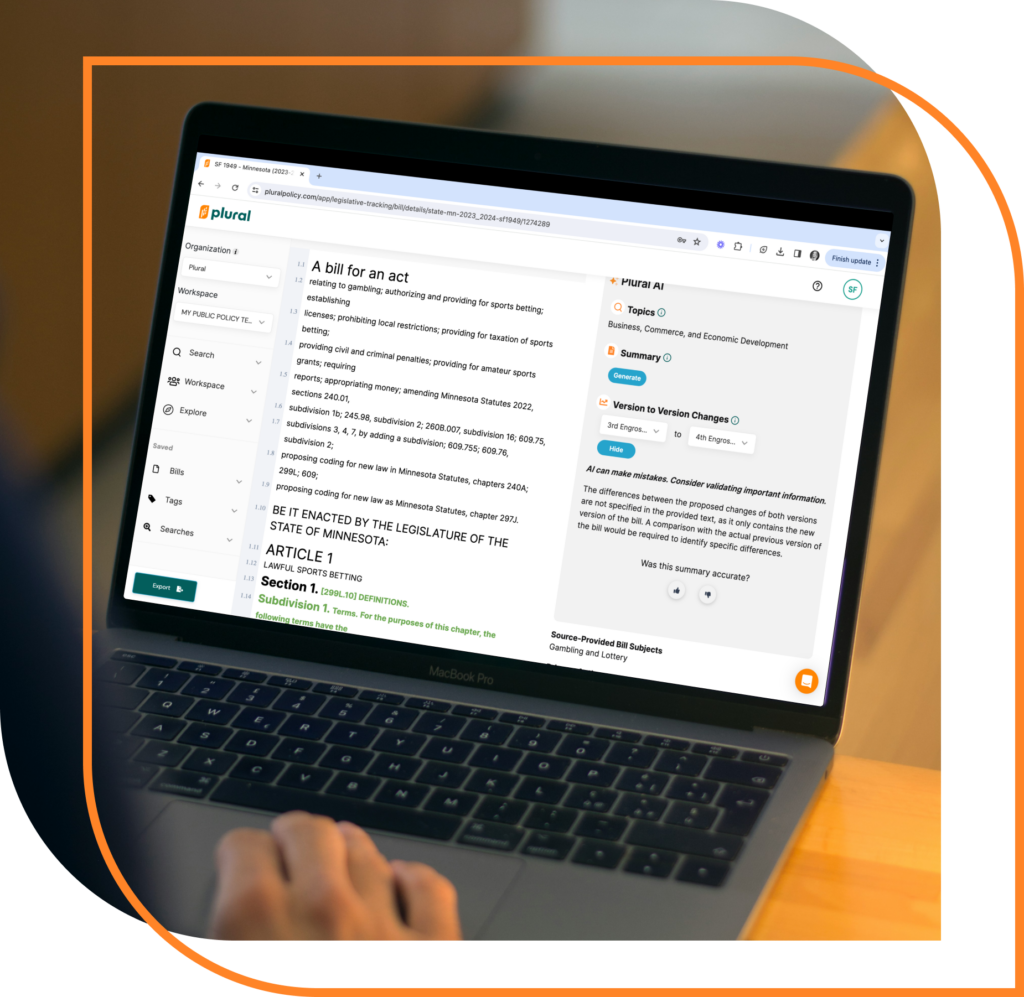One of the most notable bill introductions from this first week of Minnesota’s 2024 legislative session is SF 3803: Minnesota Sports Betting Act 2.0. The bill is the next iteration of SF 2425: Minnesota Sports Betting Act, which was introduced, but did not progress out of committee last year.
A few other factors provide reason to believe that legalized sports betting could be passed in Minnesota this session:
- While both iterations of the Minnesota Sports Betting Act were led by Republican sponsors, members of the DFL also sponsored legislation (SF 1949) last year that could be introduced again.
- Governor Tim Walz indicated this week that he would sign sports wagering legislation if it made it to his desk.
- The Minnesota Department of Revenue has estimated that revenues from legalized sports gambling could exceed $40 million.

Using Plural’s AI-Powered Tools to Better Understand Minnesota SF 3803
When used in the context of public policy and legislation, artificial intelligence (AI) is a helpful tool in analyzing bill text. AI-powered tools can help policy teams save time and quickly understand the key aspects of a bill.
AI-Powered Bill Summarizer
So what does this bill propose to do? Plural’s AI-powered bill summarizer distills the 49 pages of legislative text into a helpful summary:
“The bill proposes to legalize and regulate sports betting in Minnesota. It establishes licenses for sports betting operators, platform providers, and suppliers. It allows for mobile sports betting and retail sports betting at racetracks and sports facilities. It imposes a tax on sports betting revenue and distributes the funds to various purposes. It makes conforming changes to other gambling-related statutes. And it appropriates funds to various state agencies to implement and regulate sports betting.”
Version-to-Version Summaries
It’s easy to see how vital the bill summarizer is to quickly assessing the legislation that has been introduced this week. Public policy moves fast, and being able to act quickly and understand bills within a matter of seconds and minutes, rather than hours and days, is the key to success.
As the session moves along, our AI-powered version-to-version change summarizer will also allow you to quickly track the changes that are made to any bill throughout the session. Plural’s version-to-version bill summarizer combs pages of bill text to discern the differences between different bill versions, whether big or small.
An example can be seen comparing the introduced version of SF 1949 from last year and the final version, which did not end up passing last year. Plural provided the following summary:
“The differences between the proposed changes of both versions are not specified in the provided text, as it only contains the new version of the bill. A comparison with the actual previous version of the bill would be required to identify specific differences.”

Get Started With Plural
Plural is the AI-powered policy intelligence tool of choice for teams looking to save time, collaborate effectively, and amplify their impact. Looking to get started? Create a free account or book a demo today!

